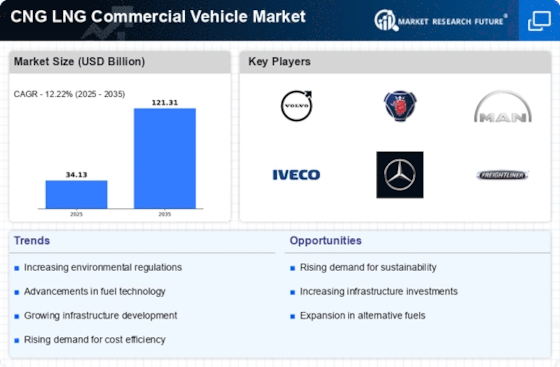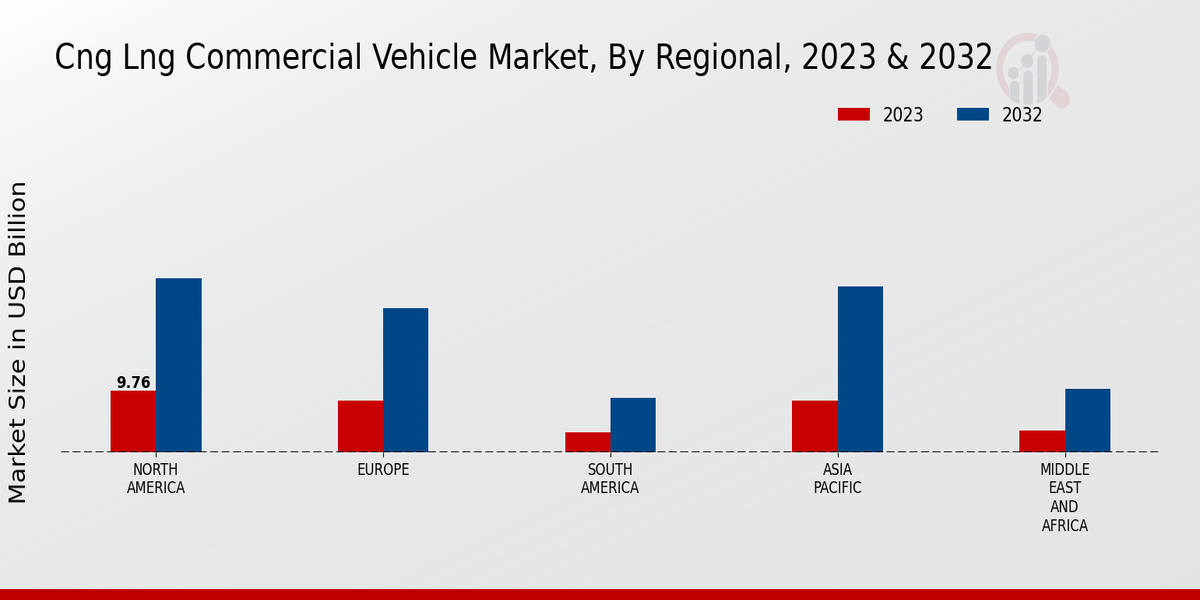Market Trends and Projections
The Global Cng Lng Commercial Vehicle Market Industry is characterized by several key trends and projections that indicate robust growth. The market is expected to reach a value of 34.1 USD Billion in 2024, with a remarkable increase to 121.3 USD Billion by 2035. This growth trajectory suggests a compound annual growth rate of 12.22% from 2025 to 2035. Factors contributing to this expansion include technological advancements, government incentives, and rising environmental concerns. The increasing adoption of CNG and LNG vehicles across various sectors, including public transportation and freight logistics, further underscores the market's potential. As these trends continue to evolve, they will shape the future landscape of commercial transportation.
Government Policies and Incentives
Government policies and incentives are crucial drivers of the Global Cng Lng Commercial Vehicle Market Industry. Many nations are implementing supportive frameworks to encourage the transition to CNG and LNG vehicles. These policies often include tax incentives, grants for infrastructure development, and funding for research and development. For instance, the establishment of CNG refueling stations has been prioritized in various regions, facilitating the adoption of these vehicles. Such initiatives not only enhance the accessibility of CNG and LNG but also promote their use among commercial fleets. As a result, the market is likely to witness substantial growth, with projections indicating a market value of 34.1 USD Billion in 2024.
Rising Fuel Prices and Economic Factors
Rising fuel prices and economic factors are significantly influencing the Global Cng Lng Commercial Vehicle Market Industry. As traditional fuel prices continue to fluctuate, many fleet operators are seeking cost-effective alternatives. CNG and LNG offer a more stable pricing structure, which can lead to substantial savings in fuel expenditures. Additionally, the economic benefits of using these fuels are becoming increasingly apparent, as they often result in lower maintenance costs and longer vehicle lifespans. This economic rationale is driving more businesses to consider CNG and LNG vehicles as viable options for their fleets. Consequently, the market is poised for growth, with an anticipated increase in value to 121.3 USD Billion by 2035.
Growing Demand for Eco-Friendly Vehicles
The Global Cng Lng Commercial Vehicle Market Industry is experiencing a notable surge in demand for eco-friendly vehicles. This trend is largely driven by increasing environmental awareness and stringent regulations aimed at reducing greenhouse gas emissions. Governments worldwide are incentivizing the adoption of compressed natural gas (CNG) and liquefied natural gas (LNG) vehicles, which are perceived as cleaner alternatives to traditional diesel engines. For instance, several countries have implemented tax rebates and subsidies for CNG and LNG vehicle purchases, fostering a favorable market environment. This shift towards greener transportation solutions is expected to significantly contribute to the market's growth, with projections indicating a market value of 34.1 USD Billion in 2024 and a potential rise to 121.3 USD Billion by 2035.
Technological Advancements in Fuel Systems
Technological innovations in fuel systems are playing a pivotal role in the expansion of the Global Cng Lng Commercial Vehicle Market Industry. Enhanced fuel injection systems, improved storage solutions, and advanced engine designs are making CNG and LNG vehicles more efficient and reliable. These advancements not only increase the performance of commercial vehicles but also reduce operational costs, making them more appealing to fleet operators. For example, the introduction of high-pressure direct injection systems has led to better fuel efficiency and lower emissions. As these technologies continue to evolve, they are likely to attract more investments and drive market growth, potentially achieving a compound annual growth rate of 12.22% from 2025 to 2035.
Increased Urbanization and Logistics Demand
Increased urbanization and the corresponding demand for logistics services are propelling the Global Cng Lng Commercial Vehicle Market Industry forward. As urban populations grow, the need for efficient transportation solutions becomes more pressing. CNG and LNG vehicles are particularly well-suited for urban environments due to their lower emissions and reduced noise pollution. This makes them ideal for last-mile delivery services and urban freight transportation. Furthermore, the logistics sector is increasingly adopting these vehicles to meet sustainability goals and comply with regulatory requirements. As urbanization trends continue, the demand for CNG and LNG commercial vehicles is expected to rise, further solidifying their role in the transportation landscape.




















Leave a Comment